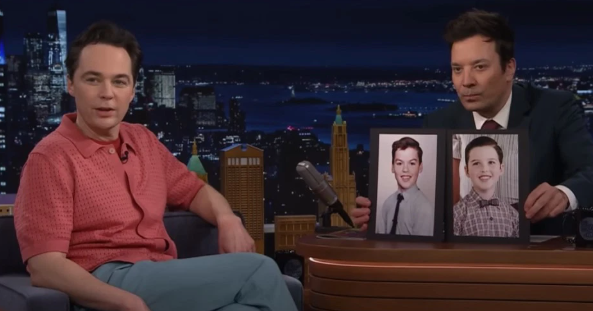
The finales of beloved TV shows often spark debates among fans, but when Jim Parsons himself weighs in, people listen. After wrapping up 12 seasons as Sheldon Cooper in The Big Bang Theory, Parsons returned to narrate and produce Young Sheldon, exploring the character’s origins. The emotional resonance of Young Sheldon’s finale left fans wondering why it felt more impactful than the conclusion of its predecessor. Parsons, with his characteristic charm and insight, shared the reasons—and they reveal a lot about storytelling, format, and nostalgia.
Why Jim Parsons’ Reflection Matters
A Tale of Two Finales
Parsons’ unique role in both series gave him a front-row seat to their similarities and differences. While The Big Bang Theory celebrated its comedic triumphs in front of a live audience, Young Sheldon opted for a more intimate single-camera approach. According to Parsons, this choice played a significant role in the finale’s emotional weight.
The Emotional Impact of Young Sheldon’s Finale
Nostalgia Amplified by Single-Cam Format
Parsons highlighted how The Big Bang Theory’s live audience brought energy and laughter. In contrast, Young Sheldon’s single-cam setup felt “intimate,” almost like flipping through an old family album. This subtle shift allowed viewers to connect deeply with Sheldon’s early life and struggles.
The Heartwarming Family Dynamic
The spin-off delves into Sheldon’s childhood in Texas, showcasing his interactions with a loving yet imperfect family. Unlike the quirky ensemble dynamics of The Big Bang Theory, this setting created relatable, heartfelt moments.
What Made The Big Bang Theory Finale Unique?
A Farewell to Friendship
The series finale of The Big Bang Theory was a celebration of camaraderie. Fans said goodbye to iconic friendships and romantic arcs, wrapped in laughter and tears.
Live Studio Magic
Parsons emphasized the live audience as a defining feature. While it added energy and spontaneity, it also shaped the show’s tone, prioritizing humor over introspection.
Why Young Sheldon Struck a Different Chord
A Deep Dive Into Sheldon’s Roots
The series explored the foundations of Sheldon’s eccentricity, from his clashes with societal norms to the tender support from his family.
Revisiting Old Friends
The finale offered fans a nostalgic glimpse of Parsons’ Sheldon alongside his Big Bang Theory co-star Mayim Bialik. This reunion was a bittersweet nod to the original series.
Real-World Parallels
By focusing on universal themes like family, loss, and resilience, the finale resonated on a personal level.
The Role of Format in Emotional Storytelling
How Single-Cam Changes the Game
Parsons described the single-camera format as “just different.” Unlike multi-cam setups, single-cam allows for nuanced performances, quieter moments, and cinematic storytelling.
Breaking the Laugh-Track Mold
Without a laugh track, viewers were free to interpret scenes organically, deepening their emotional connection to the story.
Jim Parsons on Michael Keaton as Older Sheldon
The Viral Fan Theory
Fans speculated about Michael Keaton playing an older version of Sheldon due to his resemblance to Iain Armitage. Parsons humorously addressed the idea, calling it unlikely but intriguing.
A Tribute to Talent
Parsons praised Keaton’s acting prowess, calling him a “wonderful actor” and expressing excitement about the possibility of his inclusion in Sheldon’s storyline.
Lessons Learned From Two Iconic Shows
Nostalgia vs. Novelty
While The Big Bang Theory leaned on the strength of its beloved characters, Young Sheldon offered a fresh perspective.
The Power of Context
Parsons’ reflection reminds us that the way a story is told—the format, tone, and setting—can significantly shape its impact.
Looking Ahead: What’s Next for Jim Parsons?
A Potential Return?
With whispers of another spin-off in the works, fans are eager to see if Parsons will reprise his role in future projects.
Parsons’ Legacy as Sheldon Cooper
From a quirky physicist to a complex young boy, Parsons’ portrayal of Sheldon remains a cultural touchstone, inspiring laughter and introspection alike.
Conclusion
Jim Parsons’ heartfelt analysis of Young Sheldon’s finale sheds light on why it resonated so deeply with fans. The shift in format, the focus on family, and the nostalgic ties to The Big Bang Theory created a poignant farewell that stood apart. As fans continue to cherish both series, it’s clear that Parsons’ Sheldon Cooper will remain an enduring icon in television history.
FAQs
Why did Jim Parsons find Young Sheldon’s finale more emotional?
The single-camera format and focus on Sheldon’s family created a more intimate and heartfelt atmosphere compared to The Big Bang Theory’s live-audience setup.
Is Michael Keaton really playing an older Sheldon?
While fans have speculated about the idea, Parsons expressed doubt but welcomed the thought as an exciting possibility.
Will there be another spin-off in the Big Bang Theory universe?
There’s speculation about a new spin-off, but details remain under wraps.
How did Young Sheldon honor The Big Bang Theory?
The finale included nostalgic elements, such as Parsons’ narration and appearances by familiar characters like Mayim Bialik’s Amy Farrah Fowler.
What makes Jim Parsons’ portrayal of Sheldon iconic?
His ability to balance humor with vulnerability brought depth to Sheldon, making him one of TV’s most beloved characters.